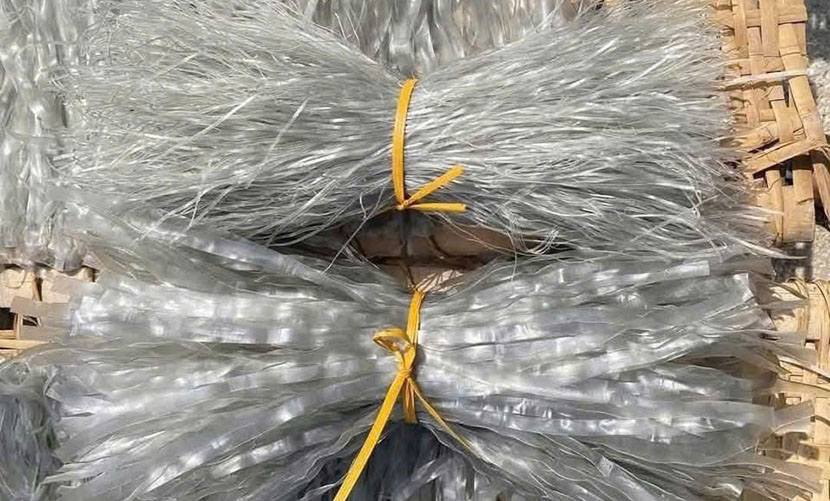
For a long time, Cao Bang glass noodles have been famous for their excellent quality and outstanding chewiness. They have the best taste among all types of glass noodles in Vietnam. As a result, the supply of Cao Bang glass noodles has never been able to meet the market demand.
Canna starch is one of the main materials of producing Cao Bang glass noodles. Notably, canna tree is one of the highest-value crops for farmers in Cao Bang province. It generates a production value of over 150 million VND per hectare of upland fields. Unfortunately, local farmers have yet to fully tap into the potential value of this tree.

Cao Bang glass noodles
In late September, local farmers are harvesting and selling canna roots. According to a local farmer, almost every household in the area grows canna trees. His family used to cultivate canna in the past but stopped when prices dropped. About five years ago, he resumed planting it. Canna grows easily here, even on high mountain slopes and yields can exceed 50 tons of roots per hectare.
With the current price of 13,000 VND per kilogram of canna starch, the crop can generate 150 million VND per hectare. This earning level has three to four times higher than maize, yet requiring less care and investment. Two years ago, when canna starch price was at 18,000 VND per kilogram, the crop’s value was even greater.
In 2022, the province had 475 hectares of canna cultivation, with a total output of over 25,000 tons. Accordingly, the average yield reached 53.6 tons per hectare. There are nearly 300 households producing canna starch noodles in the province, mainly concentrated Nguyen Binh district. In addition, some households in Cao Bang City and other areas also produce glass noodle, albeit on a smaller scale.

Cao Bang canna noodles
According to a food trader, Cao Bang glass noodles have established a strong position in the national market. Thanks to their superior quality, they enjoy higher prestige and command better prices. He noted that Cao Bang’s glass noodle industry still holds significant potential for development. However, most production remains small-scale, with little collaboration or leadership from businesses.
Currently, the province has listed Cao Bang canna noodles as a priority product for development support. Also, the province assists both farmers and businesses in production and brand building for Cao Bang glass noodles. As a result, many individuals and businesses have received support for machinery, production technology, and branding guidance.
Still, support remains negligible, as small-scale producers often fail to meet the criteria required for assistance. At present, only a few small businesses and cooperatives have invested in glass noodle production. The province is encouraging businesses to take the lead in collecting and distributing products for local farmers.
According to a food expert, the potential for producing and consuming Cao Bang canna starch noodles is still enormous. However, production capacity remains small-scale. Under the current traditional production and consumption model, it is very difficult for the local glass noodle industry to grow.
To build a brand, Cao Bang glass noodles should enter supermarkets and high-quality distribution chains. This is extremely challenging for local households, as these systems require high quality, attractive packaging, and large quantities. Moreover, supermarkets often demand a 35% cut of product value. If producers continue to rely on manual production methods, it will be impossible to scale up.

Cao Bang canna stach noodles
Moreover, if a strong brand fails to affirm, local farmers will face risk of going bankruptcy. Many traders from other provinces currently use low-quality products with misleading labels claiming to be Cao Bang glass noodles to deceive customers. Once consumers are misled and disappointed, they may boycott all Cao Bang noodles. As a result, they will put the entire production chain, from noodle makers to canna farmers, at risk of collapse.
Cao Bang’s climate and soil conditions are highly suitable for growing canna trees. The quality of canna roots from the region is higher than in other areas. Therefore, in addition to local demand, many traders from other provinces come to Cao Bang to purchase canna roots, proving the crop’s vast potential.
To fully unlock the potential of canna farming and glass noodle production, the province needs to place greater emphasis on helping locals improve production capacity and quality control. In addition, the province should enhance trade promotion activities and build a strong brand for Cao Bang glass noodles.
If you are interested in Cao Bang canna stach noodles, please contact us:
Company: Agrideco Vietnam Co., Ltd.
Address: No 02, Alley 325 Kim Nguu, Vinh Tuy Ward, Hanoi, Vietnam
Factory: Duc Chinh Commune, Cam Giang District, Hai Duong Province, Vietnam
Tel/Whatsapp: +84 989 649 804
Website: https://agridecovietnam.com
Email: agridecovietnam@gmail.com
